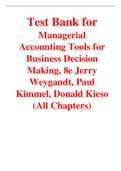Exam (elaborations)
Managerial Accounting Tools for Business Decision Making 8th Edition By Jerry Weygandt, Paul Kimmel, Donald Kieso (Test Bank)
- Course
- Institution
Managerial Accounting Tools for Business Decision Making, 8e Jerry Weygandt, Paul Kimmel, Donald Kieso (Test Bank) Managerial Accounting Tools for Business Decision Making, 8e Jerry Weygandt, Paul Kimmel, Donald Kieso (Test Bank)
[Show more]



